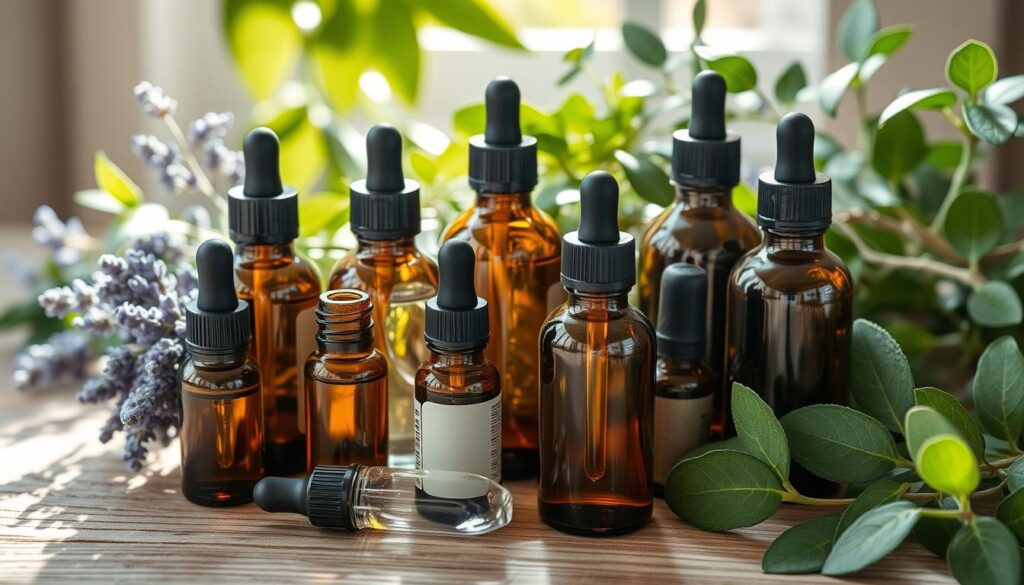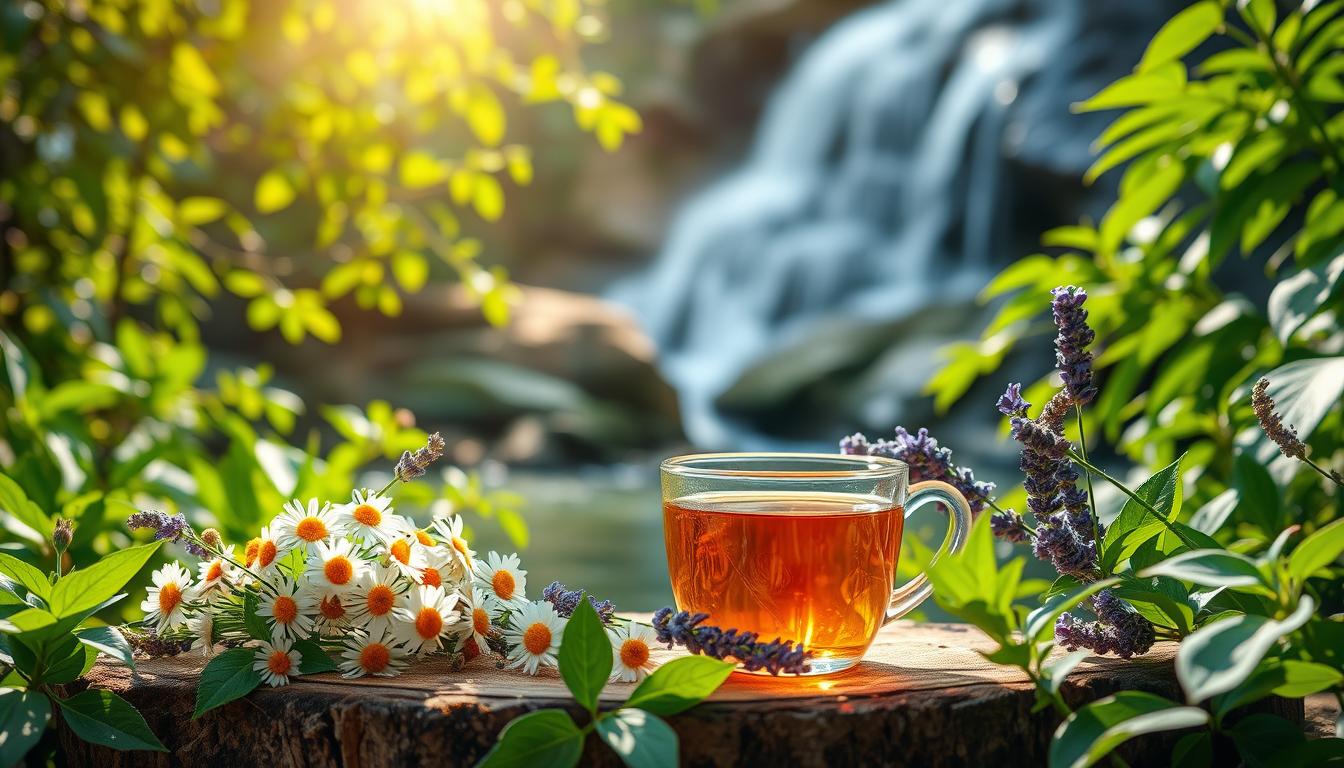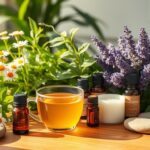Anxiety disorders affect more than 19% of adults in the United States each year, causing a range of distressing symptoms like nervousness, agitation, tension, racing heart, and chest pain. While conventional treatments can be effective, many individuals are turning to natural remedies to complement their care and manage anxiety and stress in a holistic way. This comprehensive guide explores science-backed techniques and natural solutions that can help you find relief and regain control over your mental wellbeing.
From the power of exercise and the calming effects of essential oils to the benefits of meditation and CBD supplements, this expert-backed resource covers a variety of natural approaches to address anxiety and stress. Whether you’re seeking to manage the symptoms of a diagnosed disorder or simply want to cultivate greater inner peace, the strategies outlined here can empower you to take a proactive, holistic approach to your mental health.
By exploring evidence-based natural remedies and integrating lifestyle modifications, you can unlock new pathways to wellness and reduce the burden of anxiety and stress on your daily life. Take the first step towards reclaiming your sense of calm and confidence by connecting with our team for personalized guidance and support.
Key Takeaways
- Anxiety disorders affect over 19% of U.S. adults annually, causing physical and psychological symptoms
- Natural remedies can complement conventional treatments for anxiety and stress management
- Evidence-based techniques like exercise, meditation, and essential oils can effectively reduce anxiety symptoms
- Herbal supplements and lifestyle modifications can provide long-term relief and support overall mental wellbeing
- Consulting a healthcare professional is recommended for persistent or severe anxiety symptoms
Understanding Anxiety and Stress: Causes and Symptoms
Anxiety and stress are two of the most common mental health challenges faced by individuals today. These conditions can manifest through a range of physical and psychological symptoms, profoundly impacting one’s overall well-being. Understanding the underlying causes and recognizing the various signs is crucial for effective management and treatment.
Physical Symptoms of Anxiety
Anxiety can trigger a variety of physical symptoms, including rapid heartbeat, sweating, trembling, and dizziness. Stress rashes, predominantly affecting women and individuals in their 20s, 30s, and 40s, are also a common physical manifestation of stress. Chronic stress can lead to long-term health issues, such as weakened immune function, digestive problems, and cardiovascular concerns.
Psychological Manifestations
Anxiety and stress can also have significant psychological effects, characterized by excessive worry, fear, and feelings of apprehension. These psychological symptoms can interfere with daily activities and negatively impact an individual’s overall quality of life. Generalized anxiety disorder, panic disorder, and social anxiety disorder are some of the common anxiety-related conditions that individuals may experience.
Triggers and Risk Factors
Stress typically arises in response to physical or mental pressure, often related to major life changes, work demands, or impending deadlines. Substance abuse, trauma, and family history are also known risk factors for developing anxiety disorders. Identifying and addressing these triggers can be a crucial step in managing anxiety and stress effectively.

By understanding the physical and psychological manifestations of anxiety and stress, as well as the common triggers and risk factors, individuals can take proactive steps to address these conditions and improve their overall well-being. Seeking professional help, implementing lifestyle changes, and exploring various coping strategies can all contribute to a more balanced and resilient approach to managing anxiety and stress.
Exercise as a Powerful Anxiety Management Tool
Struggling with anxiety? The solution may be as simple as lacing up your sneakers and getting your heart rate up. Numerous studies have demonstrated the profound impact of exercise for anxiety relief and its ability to enhance overall mental health. Regular physical activity can be a game-changer in managing the symptoms of anxiety and stress.
The Department of Health and Human Services recommends getting at least 150 minutes of moderate aerobic activity or 75 minutes of vigorous aerobic activity a week for most healthy adults. It’s also advised to include strength training exercises for all major muscle groups at least two times a week. Interval training, with brief bursts of intense physical activity, lasting 60 to 90 seconds, can provide many benefits as well.
Even simple, short bursts of activity can make a difference. If you can’t fit in a 30-minute walk, opt for a few 10-minute walks dispersed throughout the day. Physically active people are reported to have lower rates of anxiety and depression compared to sedentary individuals, indicating a potential link between exercise and mental health.
“Regular exercise can increase self-confidence, improve mood, relax, and lower symptoms of mild depression and anxiety.”
Exercise is essential in managing stress and should be an integral part of the stress management plan for its many benefits. Studies have shown that 25 percent of individuals who engage in regular vigorous exercise are less likely to develop depression or an anxiety disorder over a five-year period. Just a 10-minute walk may be as beneficial as a 45-minute workout in relieving anxiety and depression symptoms, showing that short bouts of physical activity can have positive effects on mood.
Participating in aerobic exercise for about five minutes can trigger anti-anxiety effects, while a consistent exercise routine can lead to a significant reduction in symptoms over time. Researchers have observed that one vigorous exercise session can help alleviate symptoms of anxiety and depression for several hours. By incorporating exercise for anxiety relief into your lifestyle, you can take a proactive step towards managing your mental well-being.
Natural Remedies for Anxiety and Stress
Dealing with anxiety and stress can be a daunting challenge, but there are natural solutions that can offer relief. From herbal remedies to essential supplements and dietary modifications, these natural approaches may help manage the symptoms of anxiety and promote overall well-being.
Herbal Solutions
Certain herbs have been studied for their potential to alleviate anxiety. Chamomile, for instance, has shown promising results in reducing anxiety symptoms, thanks to the activity of the flavonoid apigenin. Valerian and passionflower have also been used traditionally to manage stress and anxiety, with some studies suggesting they can be effective. However, it’s important to note that the FDA does not monitor the quality of herbal supplements, so it’s crucial to consult a healthcare provider before incorporating them into your regimen.
Essential Supplements
In addition to herbal remedies, some essential supplements may also help manage anxiety and stress. Magnesium and omega-3 fatty acids have been found to have a calming effect on the body and mind. These supplements can be a valuable addition to a well-rounded approach to natural anxiety relief.
Dietary Modifications
Making certain dietary changes can also have a significant impact on anxiety levels. Reducing the intake of caffeine and alcohol, both of which can exacerbate anxiety, can be beneficial. Additionally, a balanced diet rich in whole, natural foods may help support overall mental well-being.
It’s important to note that while these natural remedies may offer relief, it’s always best to consult a healthcare professional before starting any new supplement regimen or making significant dietary changes, especially for those with pre-existing medical conditions or taking medications.

| Natural Remedy | Potential Benefits | Considerations |
|---|---|---|
| Chamomile | Reduces anxiety symptoms | Generally considered safe for short-term use |
| Valerian | Helps manage stress and anxiety | Can cause drowsiness, interactions with medications |
| Magnesium | Calms the body and mind | Consult a healthcare provider for proper dosage |
| Omega-3 Fatty Acids | Promotes relaxation and mental well-being | Ensure quality and purity of supplements |
By incorporating these natural remedies for herbal anxiety relief and natural anti-anxiety supplements, individuals can take a proactive approach to managing their anxiety and stress levels. However, it’s essential to work closely with healthcare professionals to ensure the safety and efficacy of any new treatment plan.
The Power of Mindfulness and Meditation
Mindfulness and meditation practices have emerged as powerful natural remedies for combating anxiety and stress. These ancient techniques have been shown to be highly effective in slowing racing thoughts, promoting relaxation, and enhancing overall mental well-being.
Research indicates that meditation, in particular, can have a profound impact on reducing symptoms of anxiety. Studies have found that regular meditation practice can lead to long-term reductions in anxiety levels, as well as improvements in emotional regulation and cognitive function.
One of the key benefits of mindfulness meditation is its ability to cultivate present-moment awareness. By learning to focus on the breath and the sensations in the body, individuals can break free from the cycle of rumination and worry that often fuels anxiety.

Guided imagery and visualization exercises are another form of meditation that can be highly effective for relaxation. These techniques involve imagining peaceful, calming scenes, which can help to induce a state of deep relaxation and reduce physiological indicators of stress.
“Mindfulness is the basic human ability to be fully present, aware of where we are and what we’re doing, and not overly reactive or overwhelmed by what’s going on around us.” – Jon Kabat-Zinn
Integrating mindfulness and meditation into a daily routine can be a game-changer for individuals struggling with anxiety. Whether it’s a brief 10-minute meditation session or a more immersive practice, the benefits can be profound and long-lasting.
Aromatherapy and Essential Oils for Relaxation
Aromatherapy, the practice of using concentrated plant extracts known as essential oils, can be a powerful ally in the fight against anxiety and stress. By harnessing the natural therapeutic properties of these oils, individuals can find a much-needed sense of calm and relaxation.
Best Essential Oils for Anxiety
Among the most effective essential oils for alleviating anxiety are lavender, chamomile, and bergamot. Studies have shown that the soothing scents of these oils can help reduce stress, lower heart rate, and improve sleep quality.
- Lavender oil is renowned for its calming and sedative effects, making it a go-to choice for managing anxiety and promoting relaxation.
- Chamomile oil has been found to possess anti-anxiety and anti-depressant properties, providing a gentle, natural solution for those struggling with stress.
- Bergamot oil, with its uplifting and refreshing aroma, can help alleviate symptoms of anxiety and improve mood.
Application Methods
Essential oils can be used in a variety of ways to harness their anxiety-reducing benefits. Some of the most common application methods include:
- Diffusers: Placing a few drops of essential oil in a diffuser allows the scent to permeate the air, creating a calming atmosphere.
- Topical application: Diluting essential oils in a carrier oil, such as coconut or grapeseed oil, and applying them to the skin can promote relaxation through absorption.
- Inhalation: Directly inhaling the aroma of essential oils can have a direct impact on the brain, triggering the desired calming response.
Safety Considerations
While essential oils are generally safe when used correctly, it’s important to exercise caution. Certain individuals, such as those with asthma, allergies, or respiratory conditions, may need to avoid specific oils or use them with extra care. Additionally, essential oils should be kept away from open flames and used sparingly, as high concentrations can be irritating to the skin or eyes. It’s always wise to consult with a healthcare professional before incorporating essential oils into your wellness routine.
By harnessing the power of calming essential oils and aromatherapy for stress relief, individuals can unlock a natural path to relaxation and better manage the challenges of anxiety and stress.

“Aromatherapy has been shown to significantly reduce anxiety, especially in healthcare settings.”
Herbal Teas and Their Calming Properties
In the pursuit of natural remedies for anxiety and stress, herbal teas have emerged as a soothing and accessible solution. These anxiety-reducing beverages offer a range of benefits, from altering cortisol levels to providing a calming ritual in the midst of a hectic day.
One of the most well-studied herbal teas for anxiety is chamomile. A 2016 study showed that long-term use of chamomile extract significantly reduced moderate to severe symptoms of generalized anxiety disorder (GAD). The active compounds in chamomile are believed to interact with chemical receptors in the brain, promoting a sense of calm and relaxation.
Other beneficial herbal teas for anxiety include peppermint, lemon balm, and green tea. Peppermint tea has been found to have a soothing effect on the mind and body, while lemon balm has been shown to help with mild to moderate anxiety and insomnia. Green tea, in addition to its antioxidant properties, may also help lower stress levels, as indicated by a 2017 study on students.
The act of preparing and sipping a warm, calming herbal tea can itself be a therapeutic ritual, contributing to stress reduction. By incorporating these calming herbal teas into your daily routine, you can harness the power of nature to support your mental well-being.
“Drinking a cup of tea is a chance to slow down, reflect, and appreciate the moment.”

Exploring the Calming Compounds in Herbal Teas
Herbal teas contain a variety of compounds that can contribute to their anxiety-reducing effects. Some of the key players include:
- Flavonoids: These plant-based antioxidants, found in teas like chamomile and green tea, may help regulate neurotransmitters and reduce inflammation.
- Terpenes: Compounds like linalool and geraniol, present in lavender and lemon balm, are believed to have a calming effect on the nervous system.
- Amino Acids: L-theanine, found in green tea, can promote alpha wave production in the brain, inducing a state of relaxation.
By understanding the unique properties of these anxiety-reducing beverages, you can make informed choices to support your mental well-being through the power of nature.
CBD Oil and Cannabis-Based Solutions
Derived from the hemp plant, CBD oil has emerged as a promising natural remedy for anxiety and stress, offering potential benefits without the psychoactive effects associated with cannabis-based anxiety treatment. Various CBD products, including oils, gummies, and topicals, are now available, each with unique properties and applications.
Types of CBD Products
- CBD Oils and Tinctures: Concentrated CBD extracts that can be taken sublingually (under the tongue) for fast-acting relief.
- CBD Gummies and Edibles: Convenient and discreet options that allow for controlled dosing and longer-lasting effects.
- CBD Topicals: Lotions, creams, and balms infused with CBD that can be applied directly to the skin for localized relief.
Dosage Guidelines
Proper dosage is crucial when using CBD for anxiety. Research indicates that the optimal dose can vary depending on the individual and the specific condition being treated. A 2018 study found that a 300 mg dose of CBD significantly reduced anxiety levels in male participants, while lower and higher doses did not show the same benefit. It’s important to start with a low dose and gradually increase it under the guidance of a healthcare provider, especially if taking other medications.
“A 2011 study found that participants with social anxiety disorder who took 400 mg of CBD had reduced anxiety levels compared to those who received a placebo.”
Additionally, the quality and purity of CBD products can vary widely, so it’s essential to choose reputable brands that undergo third-party testing to ensure consistent potency and safety.
Lifestyle Changes for Long-term Anxiety Management
Managing anxiety and stress often requires more than just quick fixes. To achieve long-term relief, adopting an anxiety-reducing lifestyle and incorporating stress management techniques can be highly beneficial.
One essential component is maintaining a consistent sleep schedule. Practicing good sleep hygiene, such as creating a relaxing bedtime routine and avoiding screens before bed, can significantly impact anxiety levels. Additionally, a balanced diet rich in complex carbohydrates, protein, and omega-3 fatty acids can have a calming effect on the mind and body.
Reducing or eliminating caffeine and alcohol intake is also crucial, as these substances can exacerbate anxiety symptoms. Staying hydrated and being mindful of any food sensitivities or reactions can further contribute to an anxiety-reducing lifestyle.
Building a strong support network and engaging in regular social activities can also aid in managing anxiety. Techniques like meditation, yoga, and deep breathing exercises can also be valuable tools in your stress management toolkit.
While lifestyle changes alone may not cure severe anxiety, they can significantly improve overall well-being and provide a solid foundation for long-term management. If natural options are not providing relief or if anxiety is increasing, it’s essential to seek professional help from a healthcare provider.
| Lifestyle Factor | Impact on Anxiety |
|---|---|
| Sleep | Consistent sleep schedule and good sleep hygiene can reduce anxiety levels. |
| Diet | A balanced diet rich in complex carbs, protein, and omega-3s can have a calming effect. |
| Caffeine and Alcohol | Reducing or eliminating these substances can help manage anxiety symptoms. |
| Social Support | Building a strong support network and engaging in social activities can aid in anxiety management. |
| Relaxation Techniques | Practices like meditation, yoga, and deep breathing can be valuable stress management tools. |
“Lifestyle changes alone may not cure severe anxiety, but they can significantly improve overall well-being and provide a solid foundation for long-term management.”
Time Management and Stress Reduction Techniques
Effective time management can be a game-changer when it comes to managing anxiety. By prioritizing tasks, breaking down large projects into manageable steps, and utilizing planning tools, individuals can take control of their time and reduce the stress that often accompanies overwhelming commitments.
Planning Strategies
Creating a well-structured schedule and to-do list can help individuals stay organized and focused. Prioritizing tasks based on importance and urgency can ensure that crucial items are addressed, while delegating or postponing less pressing matters can alleviate the burden. Utilizing productivity apps or physical planners can further enhance time management skills.
Setting Boundaries
Learning to set clear boundaries in both personal and professional spheres is crucial for managing stress. Saying “no” to unnecessary commitments and delegating tasks when possible can prevent burnout and reduce anxiety levels. Establishing a work-life balance by stepping away from work during non-business hours can also contribute to long-term stress reduction.
By implementing effective time management strategies and setting healthy boundaries, individuals can take proactive steps towards reducing anxiety and stress in their daily lives.
“Time management is not just about getting more things done; it’s about getting the right things done.” – Cal Newport
When to Seek Professional Help
While natural remedies can be effective in managing anxiety and stress, there may come a time when professional intervention is necessary. Chronic or severe anxiety that persists for six months or longer, interferes with daily functioning, or is accompanied by physical symptoms such as a rapid heartbeat or chronic fatigue, may require the expertise of a mental health professional.
Seeking professional anxiety treatment can provide access to evidence-based therapies, such as cognitive-behavioral therapy (CBT), which has been highlighted as the most effective form of psychotherapy for anxiety disorders. Additionally, medication options like antidepressants, buspirone, sedatives (benzodiazepines), and beta blockers may be recommended to help alleviate anxiety symptoms, often in combination with therapy.
Recognizing the need for professional support is a sign of strength, not weakness. Consulting a licensed therapist, psychologist, or psychiatrist can help you develop a personalized treatment plan tailored to your specific needs, ensuring you receive the support and resources necessary to overcome your anxiety challenges and improve your overall well-being.
FAQ
What are the physical symptoms of anxiety?
What are the psychological symptoms of anxiety?
What are common triggers and risk factors for anxiety?
How can exercise help manage anxiety?
What are some effective herbal remedies for anxiety?
How can mindfulness and meditation practices help with anxiety?
What are the best essential oils for anxiety and stress relief?
How can herbal teas help with anxiety?
How can CBD oil help with anxiety?
What lifestyle changes can help manage anxiety in the long run?
How can time management and setting boundaries help reduce anxiety?
When should one seek professional help for anxiety?
Source Links
- 10 natural remedies for reducing anxiety and stress
- Natural Remedies to Alleviate Anxiety
- What Is Stress?
- Stress and Anxiety: How They Differ and How to Manage Them
- Anxiety disorders – Symptoms and causes
- Exercise and stress: Get moving to manage stress
- Exercise for Stress and Anxiety
- Herbal treatment for anxiety: Is it effective?
- Natural Remedies for Anxiety: 10 Ideas
- A beginner’s guide to meditation
- Mindfulness meditation: A research-proven way to reduce stress
- The Effect of Mindfulness-Based Therapy on Anxiety and Depression: A Meta-Analytic Review
- Can Aromatherapy With Essential Oils Provide Stress Relief?
- Best essential oils for relieving anxiety
- 20 Teas That Relieve Stress and Anxiety
- Herbs for anxiety: Does it work? Plus 9 calming options
- Relaxing Teas for Stress, Anxiety, Digestion, and Sleep
- Can CBD Oil Help Reduce Anxiety?
- Does CBD Work for Depression and Anxiety?
- 6 Benefits and Uses of CBD Oil (Plus Side Effects)
- Find out how food and anxiety are linked
- 12 Natural Remedies for Anxiety to Look Into
- 12 tips to tame stress
- 16 Simple Ways to Relieve Stress and Anxiety
- Anxiety disorders – Diagnosis and treatment
- What are Anxiety Disorders?





